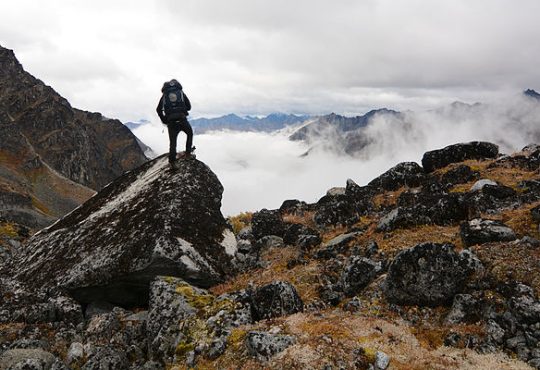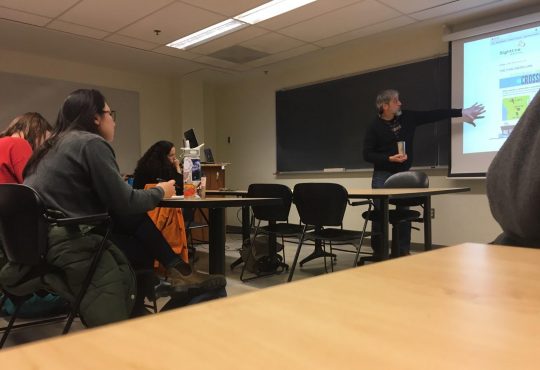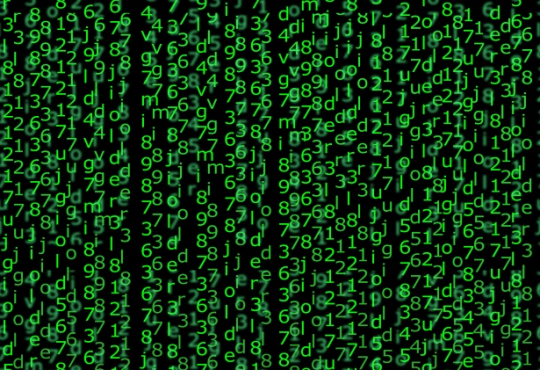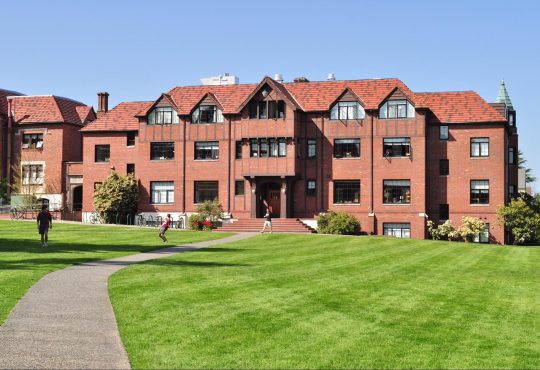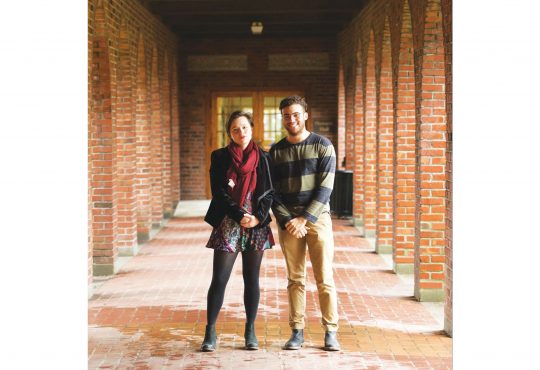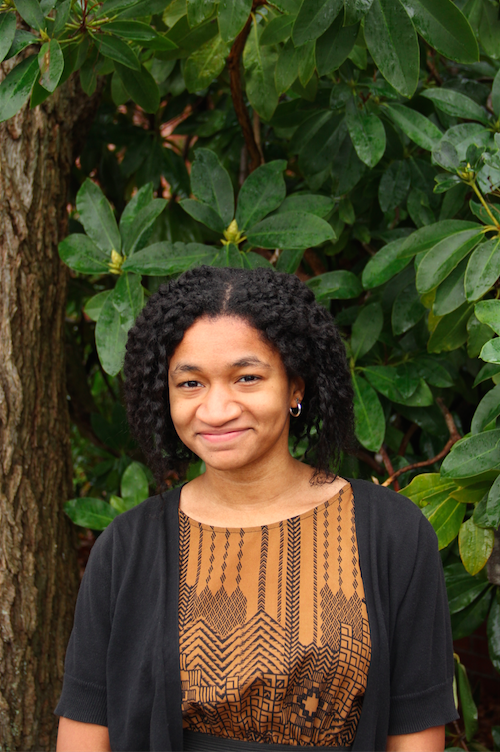
Photo by Presley Reed III
PGF: What is your position within the Black Student Union? What is the Black Student Union?
NRJ: Well, that comes with our mission statement, but I will give you an overview…I serve as the president for this year, and we have a vice president, Tyson West, our treasurer is Jensen Handwork and our secretary is Nora Katz. The BSU, as our mission statement describes, is a safe space for students of color and allies to engage the campus and surrounding communities in social justice education and multiculturalism. We are passionate about creating an enjoyable and memorable experience through the celebration of personal identity and greater social awareness. That’s our mission statement, and…what we strive to do this year, is focus on creating the memorable experience for all of our students and our members…making sure that our community is focused on social justice, education [and] multiculturalism.
PGF: In the conversation today (11/2), there was the topic of conversation and what [it] is and how…we move past the conversation to action. So how do we do that? What is the conversation, and how does the conversation turn into action?
NRJ: I think you have to take a step back into seeing…the issues that are surfacing and really, the issues that are surfacing is a frustration with overall police violence and brutality, and specifically brutality towards people of color and, derived within that, black males. I think we see that kind of escalating out of Ferguson within Michael Brown’s death, but throughout the nation as far as the ways that different cities and different groups of people have been responding. It’s apparent how much of a pervasive trend police brutality really has within the fabrics of many different cities, not just Ferguson, and with many different people’s lives, not just Michael Brown and his family. And so I think once you come to see that occurring in our events right now you can find where the qualms are and why people are getting rather frustrated – or rather, just stirred up about the issues of just the criminalization of black bodies, if you will, and how at this point we need to move past that. I think what you see is a need for action that’s progressed out of Ferguson and into different demonstrations across our nation, whether that’s in Seattle, whether that’s in people’s hometowns as they went back for Thanksgiving break, or what have you.
Through those interactions back within those different communities who are frustrated, you can hear the conversation of a need for change or need for breaking the cycle or a discussion of how traumatic and how problematic these instances are… [P]eople need support for their communities who are facing the dangers of being another recipient of either excessive police force or maybe or many cases of unwarranted police violence. That’s where the conversation stems from, and I feel like currently…our campus is grappling with understanding why and how these issues have come to be, and then after moving past that, understanding what you can do and why you even need to do something. I feel like that’s really the most frequent part of the conversation the BSU has been having is why other students need to also be involved because I feel we’ve moved past the ‘why is this a problem’ and ‘how does this happen’ and into ‘what should we be doing about it’ and ‘why should other people also get involved.’ And I think that’s part of what came out of our discussion today…how there should be more action steps taken.
PGF: Some people may say that “Oh, I don’t see acts of violence at Puget Sound. I don’t see acts of racism. Therefore, I can’t take any action.” How would you respond to people who say things like that?
NRJ: I would say something that kind of came up earlier this year when I was talking to another person about activism and what has been the most difficult barrier in talking about…racial justice or other forms of activism on our campus, and I feel like what helped me communicate that was an analogy. I’ll read…what I feel like is a good image for me: “Race is becoming a glass door that everyone wants to say they can’t see or detect, until they are hit hard by the reality. As a person of color, I can see, feel and live within that glass door because I know that race is a substantive part of my life. For students still grappling to recognize why race matters, they sometimes prefer to avoid talking about it at all or don’t want to confront the issues race creates in our society. We need to talk about why that glass door exists, and what it means for everyone who runs into it.”
PGF: What frustrates you most about the Puget Sound community?
NRJ: I think…it changes the longer I spend here and the more I get to know my own levels of awareness and education. As my own levels of education and awareness increase, I get different responses and reactions to our campus in particular… I am very fortunate to get to go to school here in Tacoma…my home town. I get to see a lot more of what the realities behind racial relations really look like off our campus, too. And that’s probably something that colors a lot of what my lens is, behind how our campus relates to issues of race – because in Tacoma there’s a lot more racial diversity than there is on our campus. And I think that when I interact with other people from racial backgrounds, it’s just a different response. I feel like the lack of reciprocity that I find on our campus is…something that alarms me, because I wonder how a lot of our student body will fare once they’re off our campus. I don’t understand how you can ignore real life issues during the time that we’re in college. Even though college is its own bubble, its own alternate world for you at the time, it just seems like it would be important for other people to connect to the outside world… My inner self feels a lot of love and gratitude towards being on our campus, because…for better or for worse, this is where we’re all going to school, and that’s the primary focus. But in between interactions with students…I am surprised by the lack of exposure that students have to race issues and people from different racial groups.
But I don’t typically get frustrated with individual students… I get frustrated with ignorance in and of itself… I feel we carry ignorance about something but…what I get frustrated with is a lack of wanting to engage, or a lack of wanting to care, to know more. There’s choosing to be ignorant… I wouldn’t want to make that choice for myself… [S]ituated on a college campus, I feel like it’s the role of our university to educate our students to be consciously active and engaged citizens, and that means being multiculturally competent, means having some level of awareness and ways of communicating across your own in-groups, and I think that’s something that gets really underplayed here, and something that’s not as emphasized, though I wish it would be. Within that frustration that I find…our campus could do a better job of preparing all of our students to go out into the global world that we’re living in and be able to have critical discussions or able to be critical thinkers in something outside of theory! So that to me is probably something that frustrates me. But I don’t fault the students. I think I fault our institution as a whole of not making that more of a requirement. And even though we’re moving into that, I think it’s much overdue.
PGF: How can white people at Puget Sound be better allies?
NRJ: …I’ll refer to this article that was sent by Professor Ostrom, regarding this article called “12 things white people can do now because Ferguson.” This article mostly talks about not being ignorant, [for] one, and then two, knowing that racism affects all of us. It mentions how “racism burdens all of us and is destroying our communities. And, quite frankly, because white people have a role in undoing racism because white people created…the system,” they should then be involved in the fight against it… But what I really appreciated was how it began from a point of education. It mentions how the first step is to learn about racialized histories, and I would move beyond just learning about what Ferguson is going through and learn about the history of the United States – not just what high school has taught, but actually getting into outside sources, and learning from non-white authors… Education is important, but you have to care to learn. I think it goes back to first – for me, personally – beginning to care, and if you don’t care, choosing to engage, because you can choose to engage without caring. But if you take it a step further and actually begin to care to learn, then you can see how it begins to affect you inwardly… Even if it’s not directly affecting your life, it’s going to directly impact the community that you’re a part of…
[M]oving forward, once you develop an understanding of the issue, then you can become passionate about working to undo whatever that form of oppression is. I feel like within those steps, you can start becoming an ally for whatever cause it is. Even for me, outside of my in-group of my own identities, I would have to go do those steps as well in order to be an ally for another group I’m not a part of. For our white students on campus who are not black-identifying or not a person of color…you can at least be critical engagers of the issues and work towards undoing the threads of racism, however they appear… I feel like that’s phase one. Phase two is picking the ways you support, and that’s a whole other conversation. But once you get to that point where you want to support, there are so many things that could happen. It may not mean that you’re the one presenting yourself as a victim, because that’s in disregard…to the actual victims… Instead of victimizing yourself…relate, using your privilege to work towards undoing racism. It’s okay to know you have privilege, but just using that privilege to be constructive rather than deconstructive is really where our student body can use better insight, and perhaps better guidance.
PGF: What are the plans for demonstrations around campus, and what upcoming events should we look for? When can students find out about/attend these events?
NRJ: …[T]he Center for Intercultural and Civic Engagement has been having these…discussions for community response to Ferguson and Michael Brown and that’s been really helpful. Not only was this Tuesday, Dec. 2 one of them, but also last Tuesday was the first one…[M]oving into next week, there will be other entities on campus…moving together…[A]t the very least, the BSU… is going to continue to do things about these issues that have arisen, but within a different approach. So the approach we took on Monday for our act of solidarity, the #BlackOut event, was something we had planned to do in November with BSUs across Washington state, and we intended to act in solidarity towards either mourning the death of Brown or being aware of the strife that it’s creating…[I]t wasn’t necessarily intended on being a direct response to the verdict’ release; it just so happened that the timing also followed into that execution.
But what I’ve noticed from the BSU’s response of our act of solidarity [is] that the campus community is kind of set in different ways. ‘Wearing black doesn’t erase institutional racism!’ True story. “And one day events that are blared on social media and then forgotten about tomorrow are not the right way to go!” True story! But I think also looking at how…you at least show presence and show awareness…even if you can’t stop and have a conversation with somebody, just letting it be known that there are people who care…[i]s the first step. For me, personally, caring is the first step…[T]hat event…was just the initial response that we’re going to have, but in the spring we’re going to come back and have more intentional planned events that are going to be a week long, and that’ll take shape next semester as it does. But it’ll be something that’ll be very intentional and very obvious for our campus in particular, especially since Monday’s #BlackOut event was a statewide act of solidarity. When we come back in the spring we’ll do things that are intentional for Puget Sound to help our student body become…not only aware but also more critical of these sort[s] of discussions…knowing where activism relates to everyone and not just the BSU. What I received news of today was a potential linkage for collaborative things happening with other members… [T]here will be other people mobilizing during or after winter break to work out ways of bringing more awareness to our criminal justice system and basic levels of what racism looks like.

